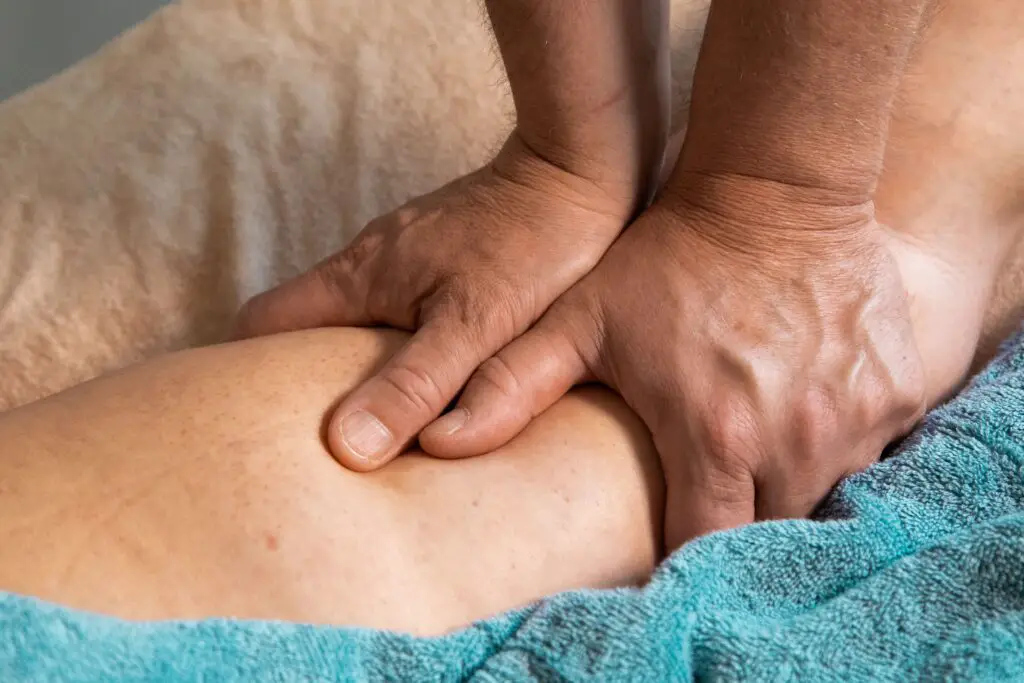As a BetterHelp affiliate, we receive compensation from BetterHelp if you purchase products or services through the links provided
Meralgia Paresthetica is a disease that can cause numbness and tingling in your legs. It is often caused by compression of the lateral femoral cutaneous nerve, which runs from your hip to your knee. This condition can be very uncomfortable and make sleeping difficult at night. This article will discuss some tips for sleeping with meralgia paresthetica. We will also provide a few helpful tips for managing the condition overall.
What Is Meralgia Paresthetica?
It is a condition that causes numbness and tingling in your legs. The condition is often caused by compression of the lateral femoral cutaneous nerve, which runs from your hip to your knee. This condition can be very uncomfortable and make sleeping difficult at night.

How Is The Meralgia Paresthetica Develops?
The meralgia paresthetica develops when the lateral femoral cutaneous nerve is compressed. This condition can be caused by wearing tight clothing, such as pants or belts. It can also be caused by pregnancy, obesity, or other conditions that cause pressure on the nerve.
Meralgia Paresthetica Symptoms
The symptoms of meralgia paresthetica include numbness and tingling in your legs. The sensation may feel like pins and needles, a burning sensation, or you may feel like your legs are asleep. The symptoms usually affect one side of your body but can occur on both sides. In some cases, the symptoms may also include pain.
What Causes Meralgia Paresthetica?
Meralgia paresthetica is often caused by compression of the lateral femoral cutaneous nerve. This nerve runs from your hip to your knee and can become compressed when you wear tight clothing, such as belts or jeans. The condition can also be caused by obesity, pregnancy, or diabetes.
How Is Meralgia Paresthetica Diagnosed?
Meralgia paresthetica is typically diagnosed based on your symptoms and a physical examination. Your doctor may also order tests, such as an MRI or nerve conduction study, to rule out other conditions.
How Is Meralgia Paresthetica Treated?
The treatment for meralgia paresthetica depends on the underlying cause. In some cases, the condition may resolve on its own. For example, if the condition is caused by tight clothing, your doctor may recommend avoiding wearing tight clothing or belts. If the condition is caused by obesity, your doctor may recommend weight loss. If the condition is caused by diabetes, your doctor will treat your diabetes. Physical therapy is also used to prevent meralgia paresthetica.

Meralgia Paresthetica Sleeping Position
If you have meralgia paresthetica, you may find sleeping difficult at night due to the numbness and tingling in your legs. Here are a few tips for sleeping with meralgia paresthetica:
- Use a pillow to prop up your legs. This will help relieve pressure on the nerve. This will help in nerve pain relief.
- Sleep on your back or side. Sleeping on your stomach can worsen the symptoms.
- Stretch your legs before bed. This can help relieve some of the symptoms.
- Wear loose-fitting clothing to bed. Tight clothing can exacerbate the symptoms and relieve pain.
Managing Meralgia Paresthetica
There are a few things you can do to manage meralgia paresthetica:
- Avoid tight clothing or belts.
- Lose weight if you are overweight or obese.
- Stretch your legs regularly.
- Exercise regularly.
If you have meralgia paresthetica, it is essential to see your doctor so they can determine the underlying cause. Treatment for meralgia paresthetica depends on the underlying cause, but you can do a few things to manage the condition. For example, sleeping with meralgia paresthetica can be difficult, but a few tips may help. You can live a normal life with meralgia paresthetica with proper treatment and management.
Living with Meralgia Paresthetics
- Hire a physical therapist to help you stretch your legs.
- Take breaks during the day if your symptoms worsen with activity.
- Wear supportive shoes and avoid high heels or pointed-toe shoes.
- Consider wearing a compression stocking at night to reduce swelling in your legs.
- If necessary, take an over-the-counter pain medication before bedtime to help ease any discomfort and enable you to sleep better.
- Try using a heating pad or ice pack for temporary relief of discomfort.
Taking these steps makes it possible to successfully manage meralgia paresthetica and get a good night’s sleep despite this condition. You can live a normal life with meralgia paresthetica with proper treatment and management.
How To Relieve Meralgia Paresthetica Pain For A Good Night’s Sleep?
If you find that your meralgia paresthetica is keeping you up at night, there are a few things you can do to help relieve the pain and get a good night’s sleep:
- Use a pillow to prop up your legs
- Sleep on your back or side
- Stretch your legs before bed
- Wear loose-fitting clothing to bed.
You should also see a pain management specialist to determine the underlying cause of your meralgia paresthetica and recommend the appropriate treatment. You can live a normal life with meralgia paresthetica with proper treatment and management. Don’t let the condition keep you from getting a good night’s sleep.
Does Walking Help Meralgia Paresthetica?
If you have meralgia paresthetica, you may find that walking helps relieve some of your symptoms. Walking can help stretch the muscles and nerves in your legs, which can help reduce numbness and tingling. Additionally, walking can help you lose weight if you are overweight or obese, which can also help to free pinched nerves.
Is Heat Or Ice Better For Meralgia Paresthetica?
No definitive answer is whether heat or ice is better for meralgia paresthetica. Some people find that heat helps relieve their symptoms, while others find that ice does. Therefore, you may experiment to see what works best for you.

Is Meralgia Paresthesia Worse When Lying Down?
Meralgia paresthesia is often worse when lying down, as this can pressure the nerve. If your symptoms are worse at night, you may want to try sleeping with a pillow under your legs to take some of the pressure off. Additionally, you may want to sleep on your back or side instead of your stomach.
Can A Hernia Cause Paresthetic Medulla?
A hernia can result in a paresthetic medulla, which causes numbness and tingling in the legs. If you have a hernia, you should see your doctor so they can determine if it is causing your symptoms.
In Conclusion
It can be caused by tight clothing, obesity, diabetes, or a hernia. Treatment for meralgia paresthetica depends on the underlying cause, but you can do a few things to manage the condition. Sleeping with meralgia paresthetica can be difficult, but a few tips may help. You can live a normal life with meralgia paresthetica with proper treatment and management. If you have meralgia paresthetica, don’t let it keep you from sleeping well. Walking may also help relieve some of your symptoms. Experiment with heat and ice to see what helps your symptoms the most. If you have a hernia, see your doctor to determine if it is causing your meralgia paresthetica. You can live a normal life despite this condition with proper treatment and management.
FAQs
Articles You Might Enjoy Reading
How to Calm Your Mind and Work On Your Anxiety if You Don’t Want to Meditate
5 Best Ways to Monitor the Quality of Your Sleep
Best Sound Machines for Sleep of 2022 – Complete Reviews with Comparison
Do Weighted Blankets Help you Sleep
What Is a Weighted Blanket
- Left Arm Pain and Anxiety: Understanding the Relationship - November 23, 2023
- Anxiety Paralysis: Coping with Overwhelming Stress - November 23, 2023
- Anxious vs. Nervous: Differentiating Emotions and Responses - November 15, 2023
This site contains affiliate links to products. We will receive a commission for purchases made through these links.



